RECRUITMENT RECRUITMENT&&CO CO


Winter Winter 2023 2023
The Association of Professional Staffing Companies in Australia




Winter Winter 2023 2023
The Association of Professional Staffing Companies in Australia



APSCo Australia's full-day conference for recruitment industry leaders - 12 pages of photos and video of the day leaders - 12 pages of photos and video of the day

APSCo Australia's full-day conference for recruitment industry

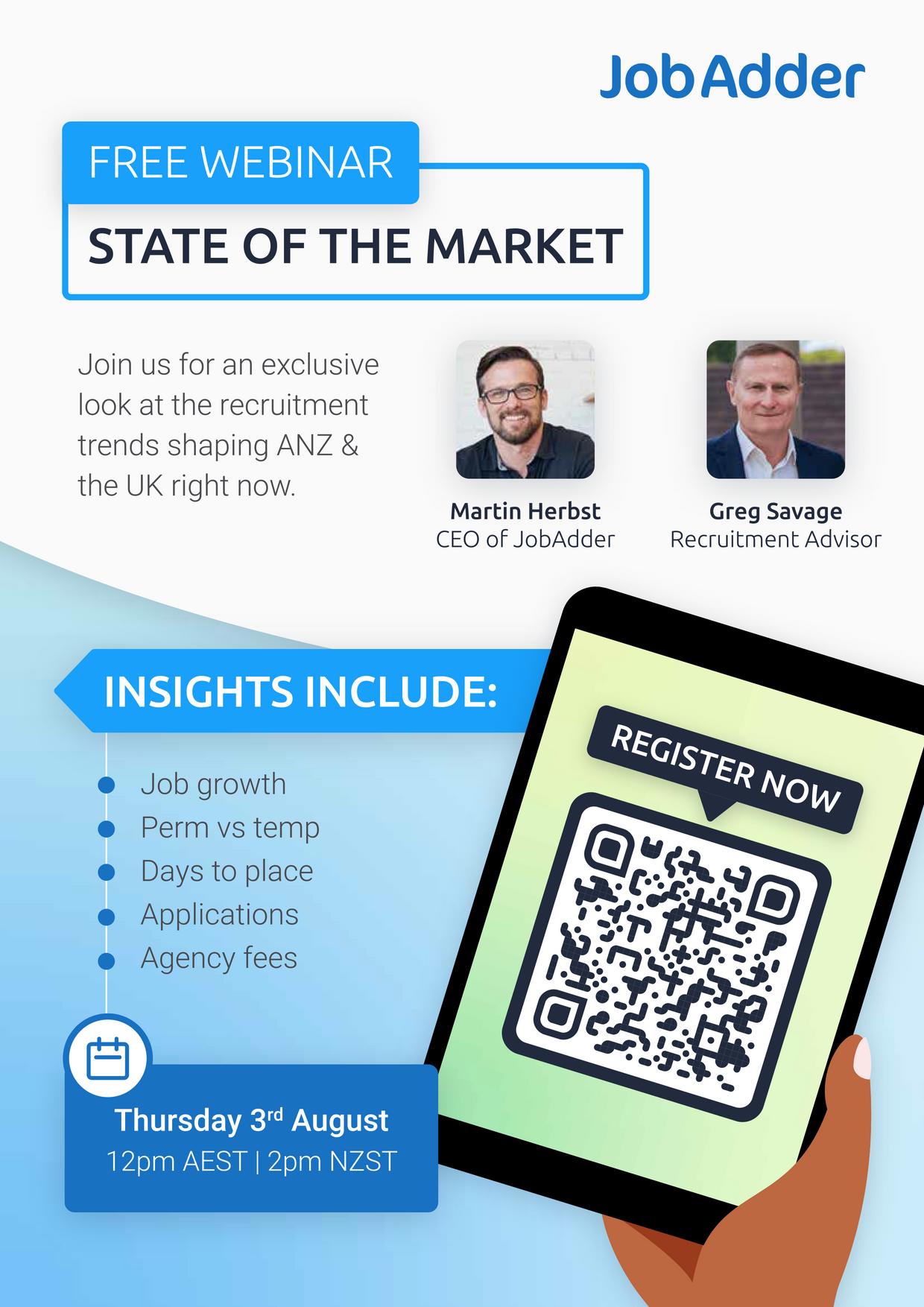
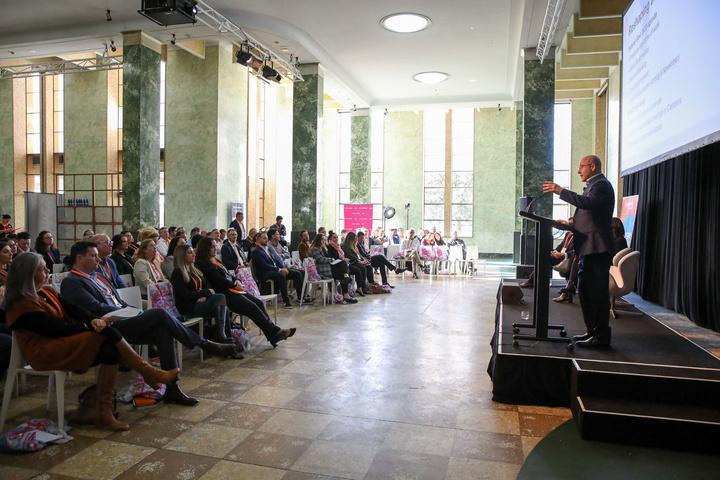




This year is hurtling along and despite changed market conditions APSCo is busier than ever. Our recent conference: Emerge 2023 was attended by over 150 professionals and once again was a resounding success.


We packed a lot into the day, tackling legal and compliance, cyber security, M&A, tech and AI, marketing and the Future of Work Once again, I would like to thank the sponsors, speakers, and the APSCo secretariat for their contribution to a very informative day
No sooner are we packing up our Conference banners, we turn our attention to the 2023 Awards for Excellence This year we’ll be at The Grounds of Alexandria on October 26th We’ve revised our categories, added to our independent judging panel and look forward to seeing the best of our profession showcase their businesses.
Events aside its BAU as we continue to liaise with Government officials and monitor the swathe of legislative change on its way. To date we have held meetings with DEWR, The Department of Home Affairs, Tony Burke’s Office as well Senator Cash, Senator Lambie, David Pocock and Matt O’Sullivan’s office
Our webinars and member meetings will return in the coming weeks as will our regional meetings and networks We’ve also welcomed a newly elected Board and I personally look forward to continuing to shape the future of APSCo alongside our nominated Directors
Our focus is to continue to grow our Membership, deepen our value proposition and stay close to our Members to ensure we are relevant and responsive while we all navigate an unusually unpredictable environment.
LESLEY HORSBURGH APSCo Australia Managing DirectorIt's the end of the 2023 financial year, and the industry as a whole has faced many different challenges from 2022. I can't believe it has been 12 months since the beginning of the financial year.
The changes that were initiated this year have been widespread, mainly due to the uncertainty caused by government transitions and proposed legislative amendments APSCo has been actively collaborating with our lobbying partners and directly engaging with ministers to represent the voice of the association and the broader recruitment community Although this endeavor has presented its fair share of challenges, we have achieved some successes and started the pathway of building relationships with the current government We eagerly anticipate more accomplishments in the upcoming year.
Global interest rates, as well as local interest rates in Australia, have also posed challenges for our businesses. Conversations with our members have indicated that rising interest rates have had a notable impact on the overall economy. We have observed this effect across various sectors, particularly in margin pressure and the impact on permanent salaries While the pressure has eased compared to the highs of 2022, some correction has transpired throughout the 2023 financial year due to interest rate fluctuations
From APSCo's perspective, it has been a fruitful year in terms of organizing events Our Gala Dinner in Melbourne was a resounding success, receiving overwhelmingly positive feedback from attendees Additionally, the conference held in Sydney was widely acclaimed, garnering excellent feedback. As we enter another phase of the economic cycle, we acknowledge that 2024 will present its own set of challenges.
My business celebrated its 20th anniversary in this financial year and one thing I have learnt is that even when you think you have faced every conceivable challenge, a new one will pop up which you could never expect.
I would like to remind all our members that the only certainty is uncertainty, and that change is inevitable Therefore, it is crucial to maintain strong fundamentals in our business and not be too quick to make radical decisions Things are changing in the way we work, we must evolve and adapt, 2023 has proven that again although maybe not as much as 21-22!

Wishing you all a successful end to the 2023 financial year.
STEVE SMITH Director, Sirius People, APSCo Australia Chair
WorkPro have released a Modern Slavery e-Book to provide Members with insights into this serious human rights issue. This resource is particularly relevant for businesses operating in Australia, where the Modern Slavery Act requires reporting on the risks of modern slavery in operations and supply chains.
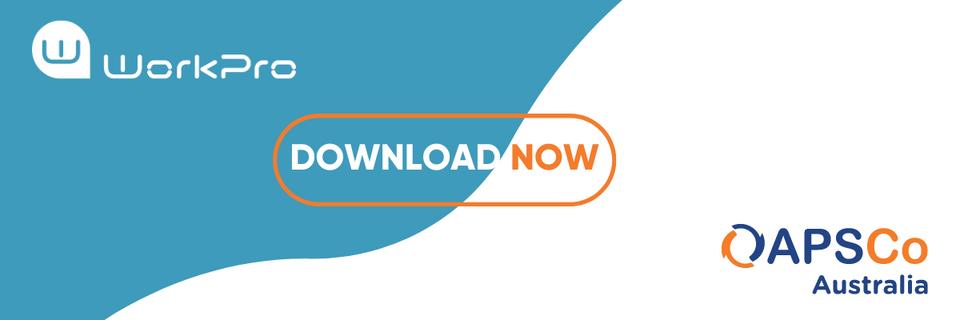
At WorkPro, we take the issue of modern slavery seriously and are committed to raising awareness about this important topic.
This e-book delves deeper into the issue of modern slavery and its impact on businesses in Australia
Know the Modern Slavery Act and what it means for your people and businesses
Examine the risks of modern slavery in operations and supply chains, and get practical steps that businesses can take to identify and address these risks
Learn how to uphold your ethical and legal responsibilities as a business and contribute to the prevention of modern slavery.
What's in the eBook?
What is Modern Slavery?
Examples of Modern Slavery
Legal Considerations
Ethical Considerations
Identifying and Mitigating Risks
Readers can download the e-book via the button below.
TargetRecruit, a leading provider of enterprise software for recruitment firms, has recently made an exciting announcement: the opening of its new office in Sydney, Australia. This strategic move highlights the company's commitment to serving its expanding client base in the Asia-Pacific region, particularly in Australia and New Zealand. With its prime location in the heart of Sydney, TargetRecruit is poised to deliver exceptional customer service and innovative solutions to regional recruitment firms.
After significant success in the US and UK, TargetRecruit understand the unique challenges faced by recruitment firms and is therefore determined to provide top-notch customer service alongside an alternative world-class software solution
“The establishment of a local Australian presence reflects our commitment to customer success in the region and represents an exciting stage in the company’s evolution”, said Andy Wigderson, President of TargetRecruit By having a local presence, TargetRecruit aims to foster stronger relationships with existing customers and forge new partnerships in the industry
TargetRecruit paves the way as a market leader in advanced recruitment software, offering a comprehensive ATS solution built on the renowned Salesforce platform. With headquarters in Houston and additional offices in London, Bangalore, and now Sydney, this vast network allows the company to leverage its diverse expertise and experience to provide the most advanced software solutions to its clients worldwide
This expansion into Australia marks an important milestone for TargetRecruit The company aims to continue to extend its reach, form strategic alliances, and establish new partnerships throughout Australia, New Zealand, and beyond This expansion presents an exciting phase in the company's growth and development
Highlighting its commitment to the region, TargetRecruit recently served as the headline sponsor of the APSCo Emerge Conference 2023, held at the iconic Museum of Contemporary Art in Sydney. This involvement further solidifies TargetRecruit's position as a pioneering force in the recruitment industry, empowering firms to thrive amidst a constantly evolving landscape.

TargetRecruit continues to grow its global footprint and commitment to delivering exceptional service and cutting-edge solutions to recruitment firms worldwide. As TargetRecruit continues to evolve and innovate, it remains at the forefront of the recruitment software industry by enabling firms to excel in today's dynamic landscape
If you are interested in discussing upgrading your CRM or ATS - please reach out to Joe Duffy at TargetRecruit joe duffy@targetrecruit com
LinkedIn’s latest Global Talent Trends Report data, shows that hiring continues to slow around the world and Asia Pacific region: Australia saw a -35% reduction. This has led to a new, more sustainable trend focused on skills-first hiring as skills become the currency of the workplace. The report provides advice from industry experts on how to recalibrate talent strategy for the future.
Tip 1: Build a strong talent pipeline by putting skills first
This shift towards a skills-first hiring strategy can immediately widen your talent pool To make this shift, it is important to first understand the skills that your organisation needs and then invest in a strong employer brand aligned with candidate priorities
Tip 2: Leverage internal mobility as a tool for retention
While internal mobility is increasing in some global industries, it’s still not top of mind for most employees in some APAC markets Promoting internal mobility opportunities can lead to higher employee retention and a more diverse and equitable workforce
LinkedIn data shows that employees stay at companies almost 2x longer if the employer is highly committed to internal hiring
Tip 3: Invest in upskilling and reskilling the next generation of leaders
The Global Talent Trends data suggests Gen Z employees are the least likely to make internal moves and people leaders in management roles are more likely to benefit from internal moves versus individual contributors Career advancement and skill development consistently rank as top priorities for employees in APAC
Tip 4: Make the business case for skills
The Global Talent Trends data tells us companies that focus on skills can expect nearly a 10%
higher retention rate, which should be enough to get your leadership to sit up and pay attention
Over 80% of Learning & Development professionals in APAC agree that it’s less expensive to reskill a current employee than to hire a new one To help you build a business case for skills you could quantify the value of leadership training and skills-building
Taking the next step
As the world of work continues to shape-shift around us, the best first thing you can do is to start asking hard questions about your company’s internal mobility culture and processes
To help you along, read the full Global Talent Trends Report here
13 categories (including 6 NEW categories).

Open to all companies in professional staffing and recruitment.
Entries close Friday August 11
Finalists will be announced from Monday September 4.
Winners will be announced at our Gala Dinner on Thursday October 26 at The Grounds of Alexandria in Sydney.





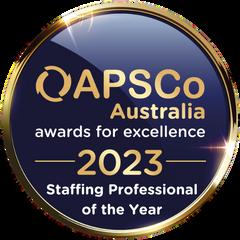
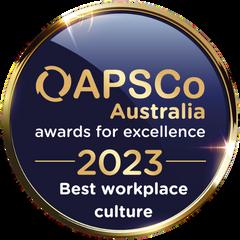











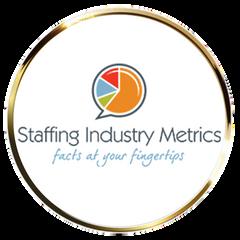






So the recruitment market is tight and for some, it seems to be tightening further by the day. So what are the options for medium-sized recruitment companies when considering the continuous development of their employees?
There are a few options to consider, dependent on your willingness to invest, the level of experience in the team or of course, who you know
For many, the company owners and directors are the driving force of the business and take full responsibility for backing their investments and giving constant direction, classroom-based training and share valuable tips and tricks on how to solve every day problems that might occur… but is this sustainable? Is this a case of working IN the business, rather than working ON the business?
There are numerous external training companies or individual recruitment specialist trainers that offer their services at reasonable rates on a regular basis or sometimes even in an ad hoc needsbased situation A needs-analysis investigation, culminating in group insights and one-to-one coaching sessions can give any individual or team a real boost
Again, it’s invaluable to have these contacts in your network and even more important to see them as an asset
Then there is the braver, initially costlier decision to directly employ a specialist trainer, who can create, develop and deliver existing and brand-new training material to the consultants and can of course, be in the thick of it, coaching people through a challenging situation, helping them to make educated decisions or just help people to take ownership and accountability for their actions.
So what is the best option for you? What needs to be considered?
How much experience do you have in the team that can help others who need it?
What internal leadership capability is present? Can some L&D responsibilities be encompassed into their role?
If the owner/Directors want to take responsibility for L&D, how can they ensure that enough time is allocated per week/month?
Russell Webb Operations Director Evolution Australia APSCo DirectorWhat budget can be allocated for L&D? If the investment is available, maybe employing a passionate individual with a remit of creating higher yield on top of higher retention, is what’s right for you?
Who do you know? If you know and trust someone who can offer employees personal skills growth, confidence and encourage accountability for implementation, maybe consider this?
But overall, the consideration of time over outcome needs to be at the forefront of the decision. Over what time frame do you need the ‘fix’?
My advice? Speak to multiple people who have done one or all of the above educate yourself, before educating others

This research piece on human behaviour and decision-making sparks interest, particularly when trying to make sense of what is playing out day to day in most organisations. Some examples include talent changing roles very regularly, talent constantly having one eye on the market for fear of missing out, talent overtly changing roles to grow their earnings and improve their job title It’s a very different landscape to 5 years ago
I then had a moment of realisation when it hit me that we ourselves were not immune to the findings! It’s a good sobering reminder to us as recruitment leaders that we are seeing unprecedented change in how talent makes decisions, responds and acts – and we need to be doing everything possible to keep our own talent engaged and progressing.
For our report, we surveyed just under 70,000 people globally and 2,200+ people in Australia. We discovered that a staggering 90% of employees are open to new opportunities. Employee loyalty is not what it used to be, especially for the younger generations. Many of us in recruitment have spent significant chunks of time (decades even!) with one organisation This just doesn’t resonate as a stay factor anymore Bring to life the significant personal growth journey their career chapter can bring, for whatever time they may invest their career with you This shift is because broadly speaking, employees no longer feel emotionally connected to their employers and workplaces. The current focus is self-preservation with all factors in life contributing. The emotional benefits that many used to derive from their jobs, like passion and a sense of belonging, were replaced by these experiences outside of work.
This shift also means that nonmonetary incentives won’t be enough for companies to attract and retain talent. So, what matters most to employees when considering their next role? Based on our research, the top five factors that motivate talent are salary, flexibility, office location, career progression, and work-life balance
To attract talent, it’s crucial for companies to offer competitive salaries that are benchmarked accurately Flexibility has become increasingly important, across “where I work”, “when I work” and “what I work on” Organisations need to embrace it as a business strategy Office location is also significant because it ties into employees’ desire to prioritise other aspects of life, and reduce their commute time. On top of that, career progression is a huge focus this year, and work-life balance remains crucial.
If you like me, find yourself perplexed about the current landscape at times, download our report via https://pageinsights co/m/2023
When I first reviewed our Talent Trends 2023 Report, I found myself reflecting on how much behaviour in the labour market has changed over the last few years, particularly in the last 12 months.
As we approach the end of financial year and navigate the craziness of securing renewals for contractors, while managing conflicting rate expectations from clients and contractors, it has been a battle not for the faint hearted in the Nation’s capital.
John McCluskey Managing Director Whizdom APSCo Director
The new Federal Government has made it clear that they intend to reduce their reliance on contractors in favour of a larger public service and potential cost benefit, posing additional challenges for the Canberra staffing and services sector in the upcoming fiscal year.
Large consulting firms such as PWC, Deloitte, and others have recently been the subject of negative media coverage, stemming from allegations of legal misconduct As a result, the perception of our industry has been negatively impacted More scrutiny will be applied to all government contracts, and it is crucial that our industry and professional staffing firms avoid being implicated in any wrongdoing
Through industry associations like APSCo, we should be strongly promoting industry best practices and quality assurance.
APSCo accreditation and certification should be our badge of difference, as a symbol of our dedication to excellence, professionalism, and high standards. We should position ourselves as part of the solution rather than being held accountable for the mistakes of others in the industry APSCo have always taken affirmative action against members in breach of APSCo's “Code of Conduct” using either remediation or termination of membership To demonstrate the value of our association and industry, let's continue to lobby governments and support the cleanup of companies and practises that reflect negatively on our industry
Across public and private sectors, recruiting firms will always support ongoing and future resource requirements for speciality, project, and niche skills that don't make economic sense to recruit permanently.
We don't do a very good job promoting ourselves, especially when it comes to value and outcomes based on contract milestones end dates.
Canberra will undoubtedly face challenges over the next two yearsbut this is a unique opportunity for us to emphasise our value as a resourcing service partner that is focused on client outcomes, compliance, integrity that is both cost effective and a great option for work that does not need to be qualified by high-end consultancies
Your brand identity should include promoting APSCo membership as the trusted brand for professional staffing to clients. The Federal Government could opt to leverage industry groups like APSCo to verify corporate compliance with minimal criteria for regulatory and quality control to lessen risks to clients and better manage employment duties to on-hired workers.
Recruitment, a sales-driven industry, has forgotten the power of selling, and it’s affecting more than just our results.
Whether we realise it or not, we engage in selling every day. This goes beyond products or services; we sell ideas, perspectives, and even ourselves We sell our opinions in debates, our skills in job interviews, and our personalities in social interactions We regularly use our skills of listening, uncovering needs, and presenting solutions to reach an agreement.
I’ve recently observed a general fear taking hold of recruiters – a fear that’s been fuelled by market conditions, average standards, disconnected sales functions, dispersed teams, and limited training and feedback –it’s the fear to actively sell And as recruitment leaders in an industry that has forever favoured building new relationships, it’s caught us off guard.
To thrive in today's competitive environment, recruiters must embrace that selling is an integral part of the human experience, one they are all capable of with the right support. And in my view, recruitment is THE human experience
But as recruitment leaders, we may have been inadvertently contributing to the problem.
We invited recruiters new to the profession to only hone their inbound sales skills and enabled experienced recruiters to rely on their account management strengths. We’ve allowed new customer acquisition to move to the bottom of the priority list and limited growth in both scenarios.
I believe the opportunity recruitment leaders have is to strike a balance between two seemingly opposing forces: building a sales culture for immediate results and fostering a customer coaching culture focused on future needs In my view, one enables the other, to nurture relationships and close deals, drive sustainable revenue, and ensure customer satisfaction
Here’s 4 starting points to unlock a selling and customer coaching culture in your team.
Align your 360 recruiters, account managers and sourcing teams goals and responsibilities. Create a pipeline of leads from sourcing teams for recruiters and account managers to qualify and convert to
Stephanie Healy Founder and Chief Executive Officer at One Recruiter
opportunities Align incentives and rewards to support desired selling and coaching behaviours
Look beyond revenue and measure conversion rates, customer acquisition, satisfaction, retention and referral rates, and overall portfolio growth. These metrics will guide you in understanding the effectiveness of your sales and coaching methods, helping you to make informed decisions about where your recruiters need the most support
Prioritize how a recruiter engages with and coaches the customer alongside sales outcomes achieved. Recognise your team’s progress and nurture a culture of psychological safety whereby errors are learning
opportunities, and development and support are prioritised responses
Empower your team with a discovery mindset. Develop recruiters capable of adapting to customers' needs to deliver personalized solutions. Equip them with the skills for outbound selling, effective questioning,
value alignment, insight selling and commercial negotiation, to bring the customer coaching culture to life
The recruitment industry must reclaim the power of selling and the art of customer coaching to foster growth and success. If we can find the right balance, and equip our teams with the mindset, skills and habits they need to

adapt, we can achieve remarkable results and support this transforming industry
One Recruiter is a new APSCo Affiliate Partner and this year's APSCo Awards for Excellence L&D Program sponsor.
To find out more about One Recruiter's bespoke program offering, visit https://www.onerecruiter.one/
Approximately 2.7 million employees across Australia are set to see a pay rise following the release of the Fair Work Commission’s (FWC) Annual Wage Review.


Last year, the FWC announced an increase of 5 2% to the National Minimum Wages (NMW), with the FWC taking account of the sharp rise in the cost of living. The FWC also announced an increase to modern award minimum wages by at least 4 6%
This year, the FWC received submissions from a range of stakeholders, including the Australian Chamber of Commerce and Industry, the Australian Council of Trade Unions, the Australian Industry Group, various employer and employee organisations, individual employers and employees, the Australian Government, and State governments
The FWC noted that the background of economic circumstances, including low unemployment, falling real wages and rising inflation, which significant weight was placed on, presented particular challenges to the review In announcing the increase, the FWC did however acknowledge that the increases will not maintain the real value of the modern award wages.
The FWC has announced a 5.75% raise to the NMW.
Significantly, the FWC also announced that it would no longer align the NMW to the C14 classification wage rate in modern awards (noting that the C14 wage rate was too low and no longer represented a proper minimum wage safety net)
Going forward, the NMW will be aligned to the C13 classification wage rate in modern awards, with the FWC applying the 5 75% increase from 1 July 2023 on the C13 classification wage rate As a result, employees earning the NMW will this year receive an increase of 8 65%, from $21 38 to $23 23 per hour
In summary:
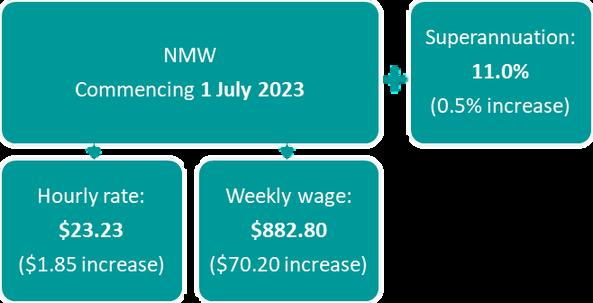
The FWC has also announced an increase to modern award minimum wages. Modern award minimum wages will also be increased by 5 75% In summary:
When will the increases be effective?
The increases will be effective from 1 July 2023.
Finally, the FWC also signalled that a research project is on the FWC’s agenda, to identify occupations and industries where there is a potential gender pay inequity and gender undervaluation of work and qualifications. It is likely that the findings of this project will be represented in the FWC’s 202425 review
What is the impact for employers?
Before 1 July 2023, relevant employers will need to take the following steps:
Employers paying the NMW (or covered by an enterprise agreement that refers to the NMW) will need to implement the 5 75% increase from 1 July 2023
Employers paying in accordance with a modern award will need to implement the increase from 1 July 2023
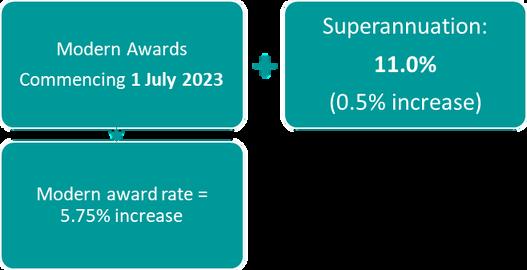
Employers with employees covered by an enterprise agreement will need to ensure that the pay rates in the enterprise agreement are at least as high as they would be under the underlying modern award
Employers who pay annualised salaries which are intended to subsume all modern award entitlements should be undertaking assessments to ensure that those annualised salaries are still sufficient to absorb all modern award entitlements
It is recommended that all employers take note of the increases and ensure that each employee is being paid at or above the new minimum rates
If you would like further information about this increase, or assistance in determining which modern award applies to your employees, please get in touch with Squire Patton Boggs
Looking back at major events you have personally experienced is fascinating. Were there long-term impacts, or is it back to business as usual? By
Rod Hore of HHMC Global.
The Covid years appear to have significantly changed the local recruitment industry. The merging of trends that were already underway combined with new strategies and social impacts has changed the way recruitment agencies are operating today
For example, plenty has been written about AI and its impact on the recruitment industry. And there are continual views on flexible work, working from home, and other impacts on Monday-to-Friday office work.
I focus on the changes in business owner strategy and its impact on the structure and operation of a recruitment agency For over a decade it has been puzzling that some recruitment industry trends from overseas, especially from the UK and US, have not taken hold here in Australia.
We have wanted offshore outsourcing to be part of the strategy conversation with recruitment agency owners as we believe decisions will be less robust without this option as part of the mix
Most improvements in a recruitment agency’s performance involve some combination of technology and people. Traditionally leaders have been bold and creative with technology investment, but less so with options around human capital.
Offshore outsourcing in the recruitment/staffing sector is an accepted part of the business structure in the US and UK but has been less prevalent here Outsourcing of processes in the recruitment function, payroll and accounts functions, and marketing function is well established globally.
The benefits from offshore outsourcing include cost, scalability, speed to market, process and productivity gains, and improved client and candidate service. There are risks that need to be managed, just as there are with hiring new or experienced staff into your business.
Today this is a topic of conversation that has equal place with other business improvement topics.
Possibly Covid has taught all of us that some long-held beliefs were not that important, and a broader range of options can be discussed as part of the business strategy
For owners there are longer term benefits. Building equity value is a goal for most. Creating a business that has greater sustainability, flexibility, more predictable revenue streams and margins, will improve the attractiveness to potential acquirers, as well as maximise the value potential.
We live in an increasingly digital world where the future of work is being tested by cybersecurity. These challenges for the future of work are complex and will continue to challenge businesses in all industries including professional services and consulting businesses, writes Platinum WFM's Darren Berson.

New technologies, work practices, remote and hybrid work environments will continue to challenge businesses as cyber criminals continue to test access to data and information Outlined below are some of the challenges that cybersecurity presents for businesses in their journey towards the future of work
One of the dominant challenges is the constant evolution and sophistication of cyber threats. Today we are seeing rapid development of automation and AI, and globalisation of data in our digital interconnected worlds.
Cyber criminals continue to search for vulnerabilities, requiring organisations to be super vigilant of threats and the latest security measures and capabilities that can protect their employees and businesses This requires proactivity, regular risk assessments and ongoing organisational training to to ensure everyone is up to date and has cyber security at the forefront of their mind
Since our Covid lockdowns, the world of remote and hybrid work has become a more common expectation in the retention and management of workforces.
As more and more employees work from home, remotely, from the office or both, businesses are challenged by security risks external to their traditional working environments
Security needs to reflect access through possible unsecured networks or devices that may open businesses up to cyber attacks Tools, training and secure working methodologies and environments will help future of work engaged businesses protect themselves from threats.
Our interconnected digital world for commerce, including our growing internet driven world of interconnected devices, continue to challenge businesses and how cyber security is managed This world driven by the internet increases access points for cyber security exploitation, increasing the need for connected devices to be secured and to reduce vulnerabilities for attack
Data privacy and protection is also an increasing concern with governments around the world working to tighten rules and regulations on how personal data is managed and handled. Already in Europe, for some time, strict rules have been in place requiring organisation to comply to data protection and management
Darren Berson Founder, Platinum WFMprinciples and face penalties and reputational damage for noncompliance Future of work demands continue to bring into focus these requirements as workforces become decentralised
One of the most critical challenges facing business in the future of work is the need for training and retention of highly trained cyber security professionals capable of staying ahead of the threats. As demands grow, skill shortages will test capabilities. As professional services organisations like APSCO continue to advise industry and government, the importance of talent shortages of professionals in the cybersecurity sector will need to be continually reviewed with emphasis placed on training and education of experienced professionals
threats highlighted above, continue to be critical requirements to combat the significant threats to future of work evolution and capabilities The future of work is significant in the evolution of modern workplaces that are increasingly digital. For the benefits this brings participants it is important this is offset with core cybersecurity management practices in place.
On 6 June 2023, a number of key changes to the Fair Work Act 2009 (Cth) (Act) commenced. Notably the sunsetting of zombie agreements, changes to the bargaining and approval process for enterprise agreements and changes to multi-employer enterprise agreements.



Enterprise Agreements that were approved prior to 2010 are colloquially been known as zombie agreements Unless an application is made to the Fair Work Commission (FWC) the remaining zombie agreements will be automatically terminated on 7 December 2023.
Prior to 6 June 2023, employers with employees that are still covered by a zombie agreement are required to give them written notice of the zombie agreement changes, failure to do so may result on civil penalties for employers.
From 6 June 2023, the approval requirements for enterprise agreements will now be simplified
The FWC has issued the Fair Work (Statement of Principles on Genuine Agreement) Instrument 2023 on 12 May 2023. This statement provides guidelines on what the FWC should consider when deciding whether or not to approve an enterprise agreement
The approval of enterprise agreements will depend on whether the FWC is satisfied that covered employees have genuinely agreed to it.
Now the FWC is required to be satisfied that an enterprise agreement passes a global assessment that employees are better off The line-byline comparison between the proposed agreement and relevant modern award will now no longer be applicable
From 6 June 2023, three new bargaining streams will be introduced, the supported bargaining agreements, single-interest agreements, and cooperative workplace agreements streams Broadly speaking, these allow for bargaining for multi-employer agreements.
The most notable stream is the singleinterest agreements stream that allows the FWC to issue authorisations that allow bargaining representatives to group employers together to bargain for a single multi-employer agreement This authorisation can be made by the FWC with, or in certain circumstances, without the consent of applicable employers.
For more in-depth information please see the following link to the article regarding these changes on Gadens' Website Further, Gadens has also published an infographic checklist for you to download that outlines the key dates and changes
As a recruiter, managing temporary workers across multiple different clients can be challenging with scheduling conflicts, differing expectations and disorganisation. But not to worry, you can overcome these challenges with the right approach and tools, ensuring you provide all of your clients with the temp talent they need. The team from JobAdder explains.
1. Create a centralised database of temp talent
A centralised database or talent pool stores all the information you need about each worker's skillset, availability and work preferences.
This will allow you to quickly identify the right candidates for each client, streamline the hiring process and minimise the risk of miscommunication.
2. Use a project management system
Utilise a project management system or software (wink wink like an ATS) to assign tasks, track progress and communicate with your temporary workers
This will help ensure that all parties are on the same page, deadlines are met and that your workers have the resources they need to perform their jobs effectively
3. Set clear expectations between clients and temp workers
Clearly define the job requirements, expectations and timelines for each client, and ensure that workers understand their responsibilities.
Handy tip: Set a reminder in your ATS so you know when a temp placement is coming to an end. That way, you can ask the client if they’d like to renew or see if you have other roles that could be a good fit for that temp worker.
4. Offer support and resources for worker success
Provide access to training materials, onboarding documentation and other tools that will help your temps acclimate to their new work environment quickly
When possible, assign a mentor or point of contact for each worker to ensure they have someone they can turn to with questions
When possible, assign a mentor or point of contact for each worker to ensure they have someone they can turn to with questions.
5. Monitor performance and provide feedback
It's essential to monitor the performance of your temporary workers to ensure they’re meeting all expectations.
Regularly review their progress and address any issues promptly. This maintains a high level of client satisfaction and nurtures the professional growth of your temporary workers
Want more solutions to your temp challenges? JobAdder’s Temp Express dashboard increases the visibility of your entire temp and contractor workforce at a glance and helps ensure compliance and candidate aftercare
Find out more here and watch a five minute demo video
In the ever-evolving world of technology, automation and artificial intelligence (AI) in particular, have now become readily accessible to the average person. We find ourselves at the dawn of a revolution where automation and AI are reshaping industries.
Aaron McIntosh Managing Director Bullhorn APAC
We’re fast approaching a critical crossroads moment, where we must choose which path to take There will be those who wholeheartedly embrace AI and all the remarkable benefits it brings, and there will be those who resist its advancement, wary of the unknown
There’s no question, AI and tech will shape the future of the recruitment industry, but how far will it go? Where will it stop? What will it all look like? And, ultimately which path will you choose to take?
While the recruitment industry has traditionally been slow to adopt new technologies, automation solutions provide a glimpse into the immense potential at our fingertips and can be used to enhance productivity and more effectively communicate with candidates at scale
At APSCo Australia’s recent Emerge conference I facilitated an esteemed panel of experts. Together we took a deep dive into the world of automation and AI to provide a comprehensive view of its true capabilities within the recruitment industry where it can streamline operations, and drive productivity gains
During the discussion Vinney Brown, General Manager from ManpowerGroup commented, “Bullhorn Automation, it’s a form of artificial intelligence which we’re using successfully at the ManpowerGroup An example is on a candidate’s first day, when they are starting a new assignment they receive an automated thank you video message from me.”
Automation is not a distant concept for the recruitment industry; it is already helping numerous agencies thrive in a changing landscape. Get on board to make sure you don’t get left in the minority
Does your business operate fixed term contracts? Did you know that the Federal Government has introduced new limits to fixed term contracts? These changes come into effect December 2023. This should give employers enough time to understand their new contractual obligations and ensure compliance. Dianne Gibert from Certex International explains.
What is the issue with fixed term contracts?
Fixed term contracts serve a legitimate purpose for sourcing workers, especially in the shortterm However, for many employees, ongoing use of such contracts exacerbates job insecurity
“Changes to the use of fixed term contracts mean that employers retain the flexibility to manage their workplace needs, while providing protections to employees who may be exploited by these contracts when inappropriately used.” (Department of Employment and Workplace Relations)
What are the new rules?
Under the amendments it is an offence to enter into a fixed term contract with an employee:
For longer than two years
That allows the contract to be extended/renewed for longer than two years
That provides the option to extend/renew the contract more than once
Further, it is an offence for an employer to take action to try to avoid any of the above limitations.
Employers are required to provide a Fixed Term Contract Information Statement to all employees entering a fixed term contract The Statement will be developed by the Fair Work Ombudsman and outline limitations, exceptions, and the dispute resolution procedure.
What are the exceptions?
Exceptions apply when genuinely necessary and appropriate:
Performing a discrete task for a fixed period
Apprentices and trainees
Undertaking essential work during a peak demand period (e g harvest)
Temporarily replacing another employee on long leave (e g workers compensation leave)
Earning above the highincome threshold
Exemptions also apply where fixed term contracts are permitted by an applicable modern award. The Minister can make regulations to exempt certain types of contracts.
Dianne Gibert Managing Director Certex International
What are the consequences of breaching limitations?
If a fixed term contract is made in breach of the new provisions:
The ‘expiry mechanism’ will be considered invalid; and All other contract terms will remain valid
In other words, the employee retains all terms and conditions of the contract but will be considered a permanent employee They also gain access to relevant safety net provisions including:
Access to unfair dismissal proceedings
Employers found guilty of breaching limitations may also be subject to civil penalties
Does your business use fixed term contracts? If so, will those arrangements still be permitted once the new rules take effect?
Remember to consider your options alongside the operational needs of the business and the applicable modern award terms that cover affected employees. These changes come into effect in December, but we recommend employers transition any fixed term contracts sooner rather than later.
The ever-changing legislation around working with employees and contractors can be frustrating and time-consuming for businesses
Luckily, where employment law can confuse, Certex is here to clarify.
Our iEngage assessment – part of our iSuite Risk Management Program – is a high-level assessment of where your risks might be.
It covers contract law, renumeration, employee rights, and more and is designed to identify areas that may require further analysis and support.

Our assessors are Labour Hire and Compliance experts, and we have serviced the Recruitment industry for over 20 years These changes to fixed term contracts are ground-breaking, but the consequences for noncompliance can be extremely costly. We can help make sure you GET IT RIGHT.
For more information, email info@certex.com.au
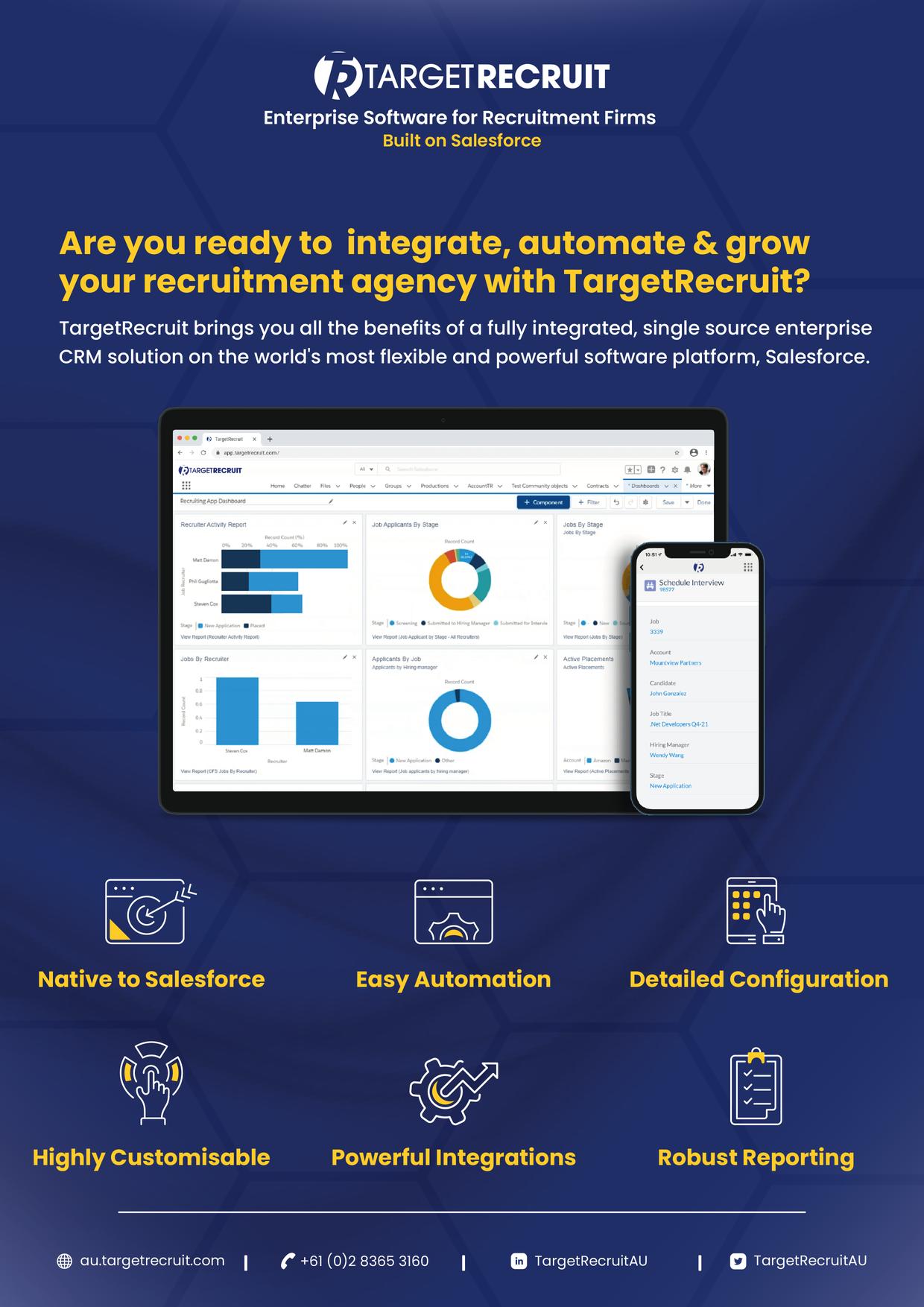

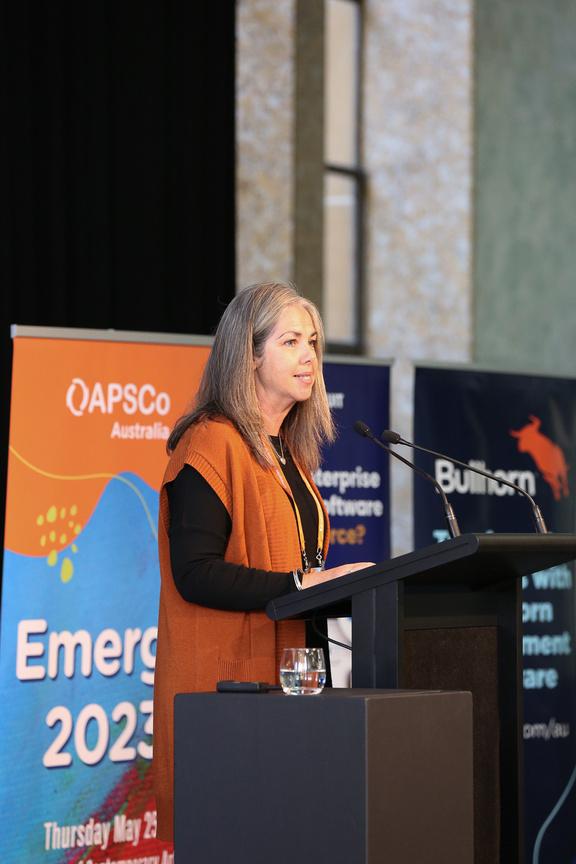
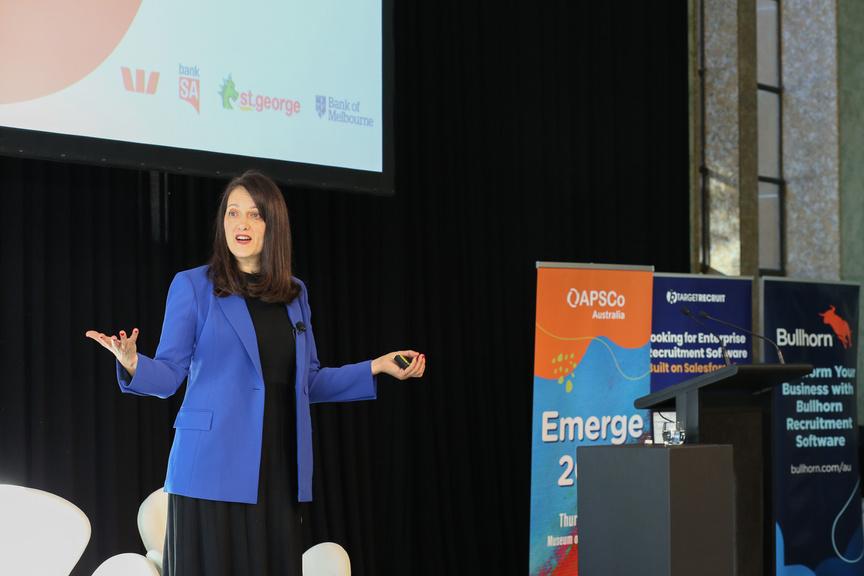
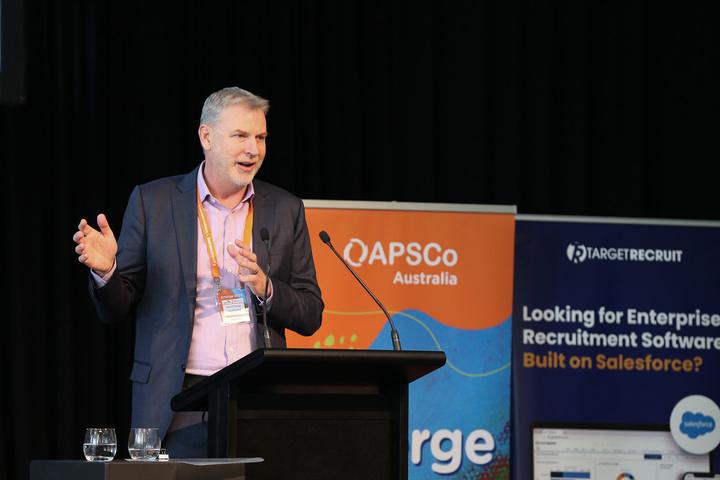

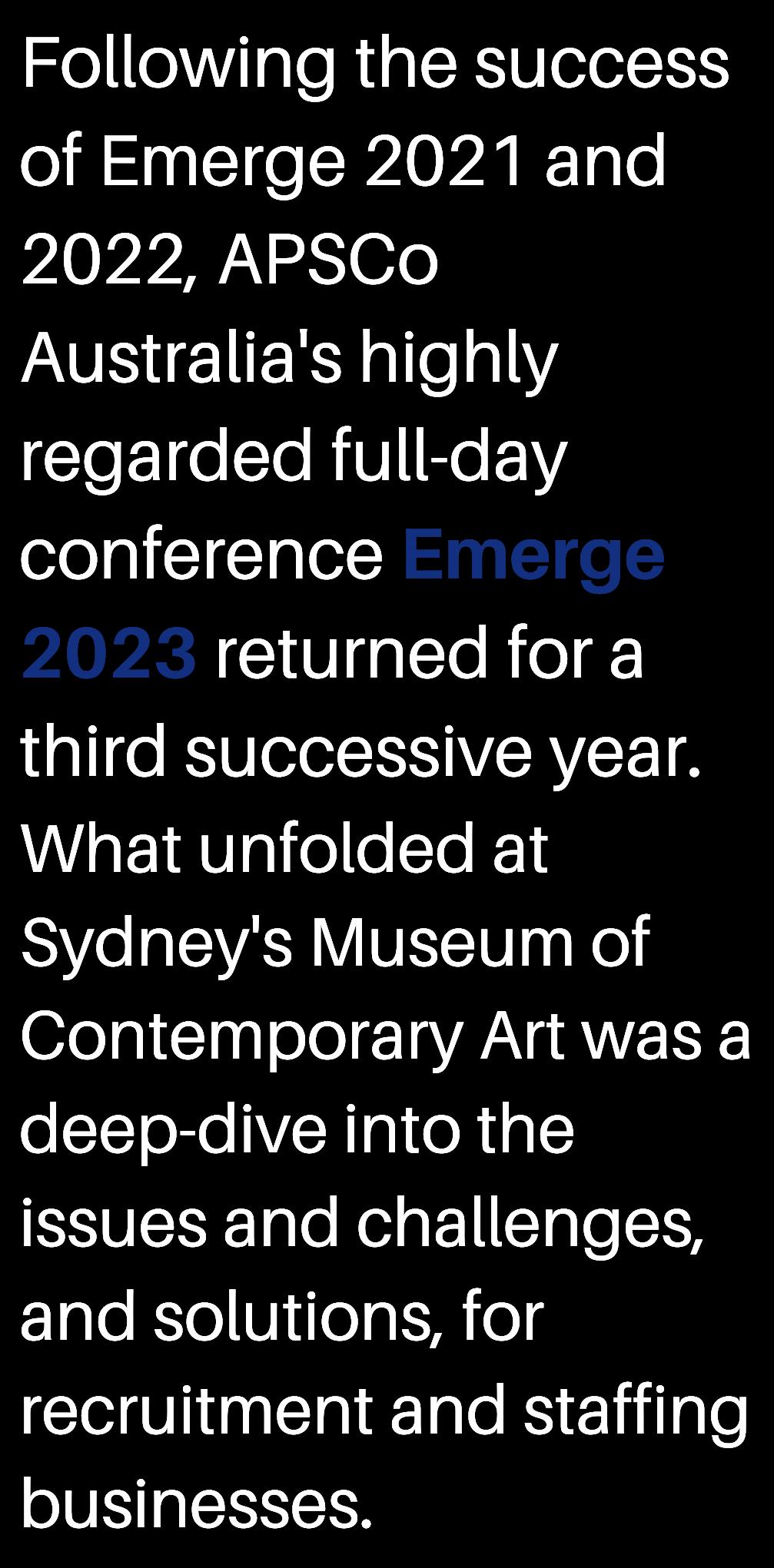 APSCo Au MD, Lesley Horsburgh
APSCo Au MD, Lesley Horsburgh
MorningContentsponsored by:







P a n e l : L a w i n
Our legal panel - Law in Order - cast an employment law and in-house lens on the changing IR landscape and its impact on the recruitment profession Facilitated by Martin Richardson, a well known face among recruitment owners and operators, this discussion covered proposed changes in legislation along with audience Q&A. 01
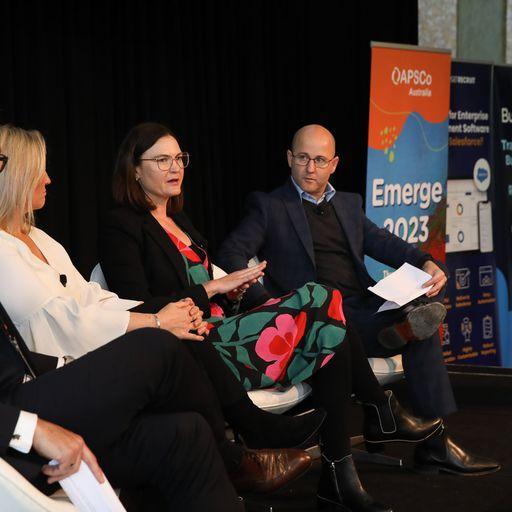
Nicola Martin, Squire Patton Boggs
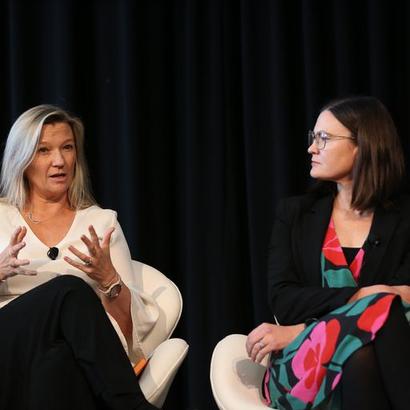
George Haros, Gadens

The Law in Order Panel
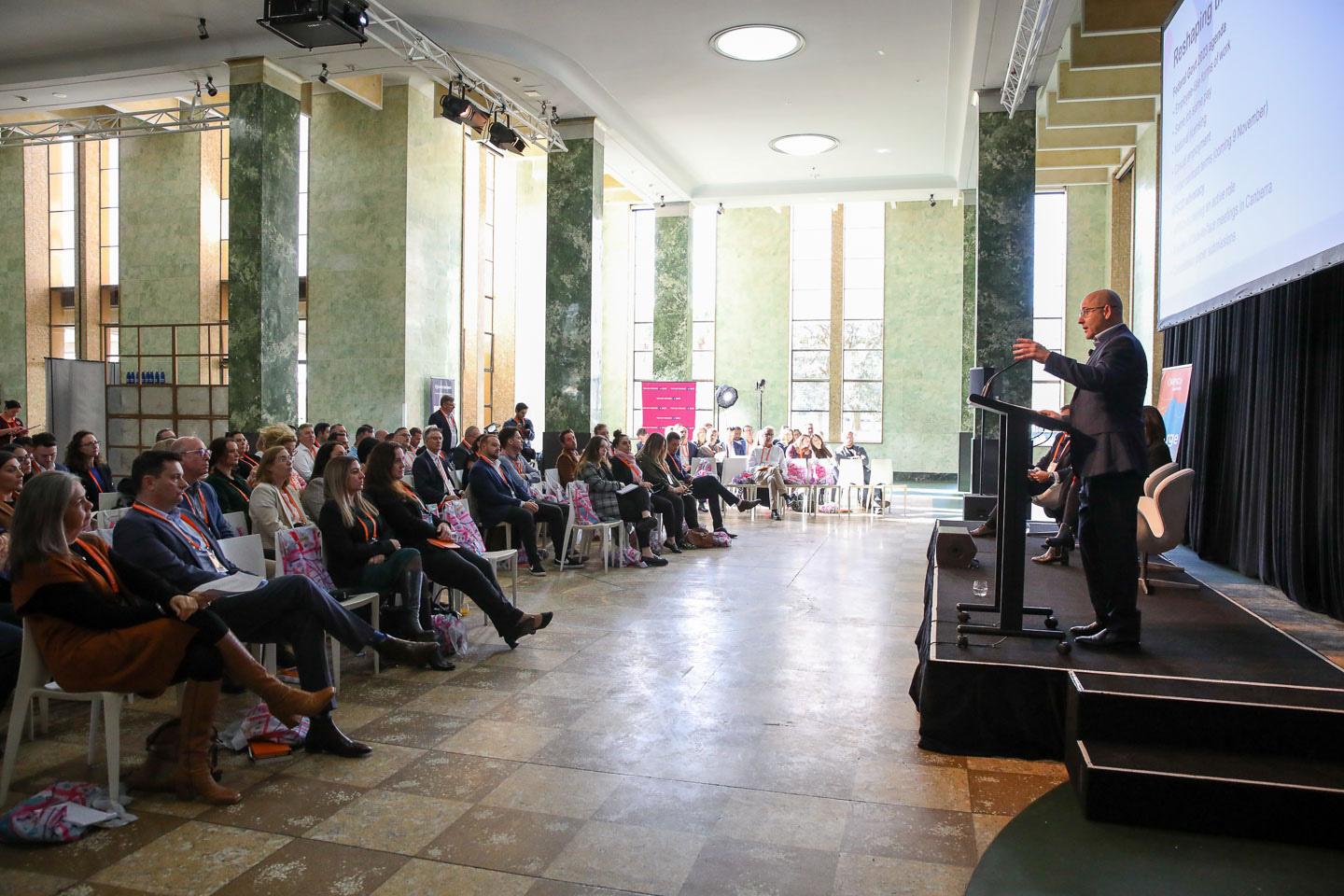
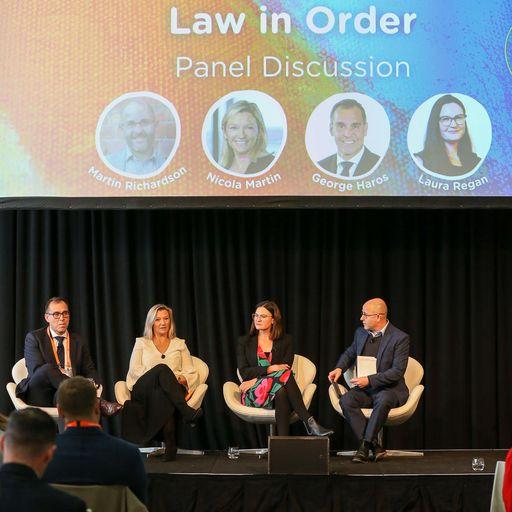
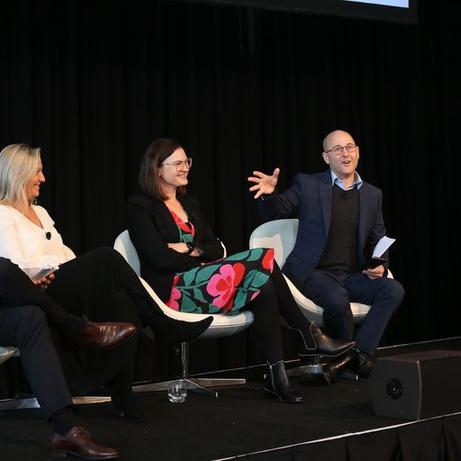
Nicola Martin, Laura Regan & Martin Richardson
Laura Regan, Davidson
Martin Richardson, Ready Set Recruit Legal
The acquisition of digital and technology recruitment specialist Finite Group in July 2022 came during a buoyant period for the M&A market The sale of the business, which was established in 1998, was a special moment for its owners and the sector at large Convened by Lesley Horsburgh; Paul Masters and Tracy Thomson explored the challenges and pitfalls in pathing a profitable exit; and were also joined by Squire Patton Boggs Ashley Rose who cast a legal lens across the discussion.






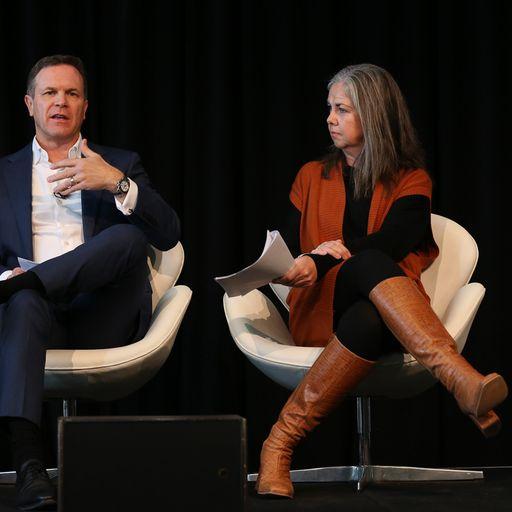
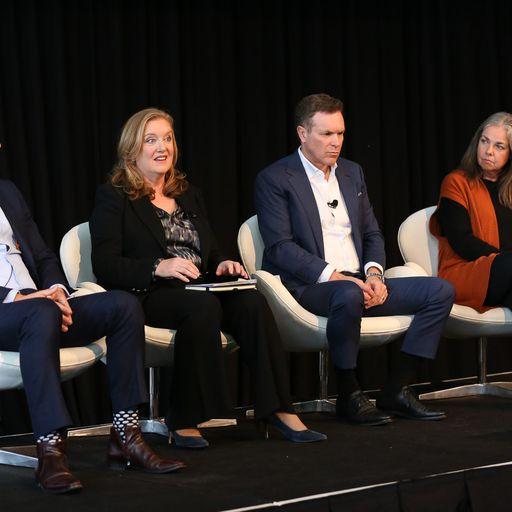
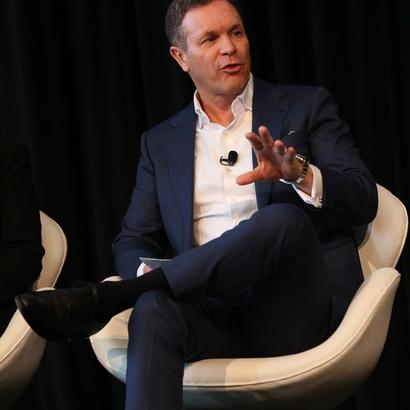
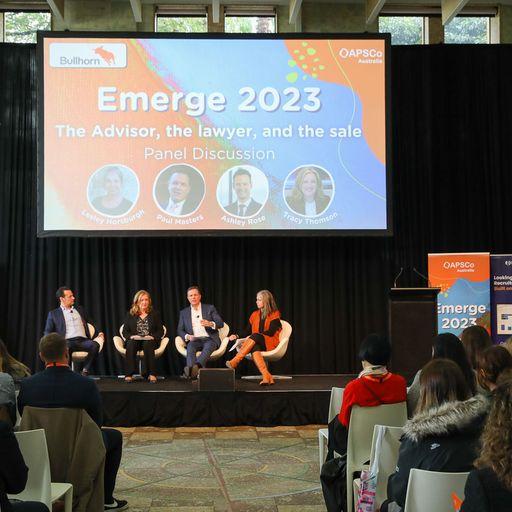

a







Following on from a year of high-profile data breaches, our "Let's talk about risk" panel provided insights into the world of cybersecurity and risk, and a roadmap to navigate how to respond if a data breach occurs in your business.
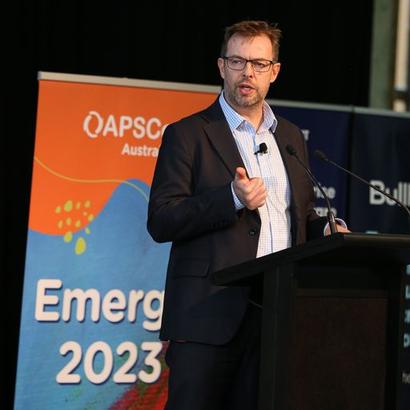
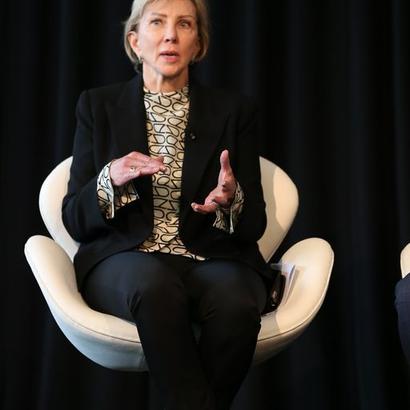
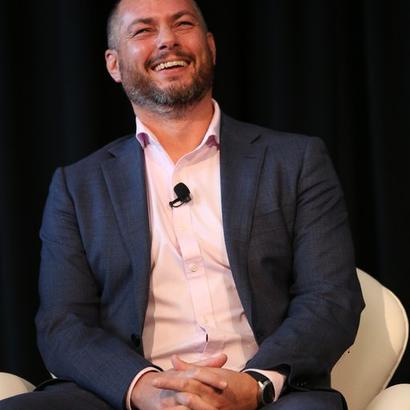
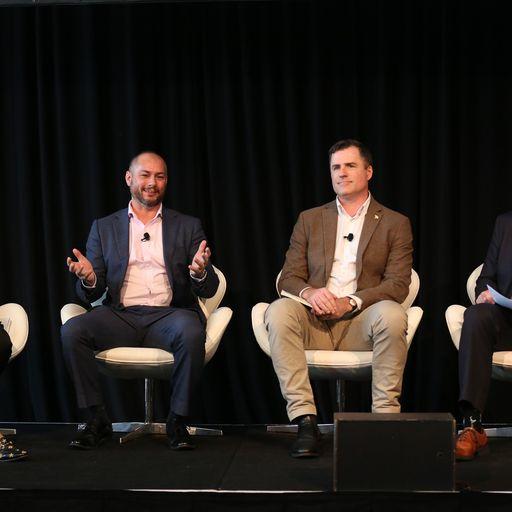

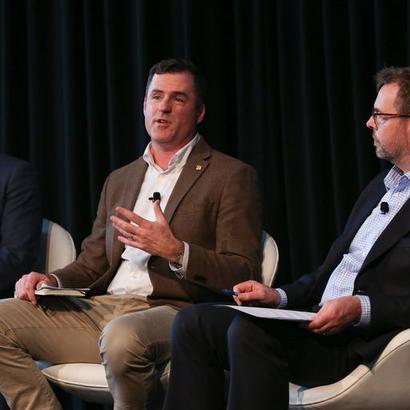
Blare Sutton & Rhys Ryan
Blare Sutton, McGrathNicol
The Let's talk about risk: Cybersecurity Panel
Rhys Ryan, Porter Novelli Australia
Meagan Jeffery, Talent International
Dudley Kneller, Gadens
With panellists from SEEK, ManpowerGroup, HireVue and Bullhorn, our tech, innovation and the robots panel discussed how AI and tech is shaping the future of the industry.
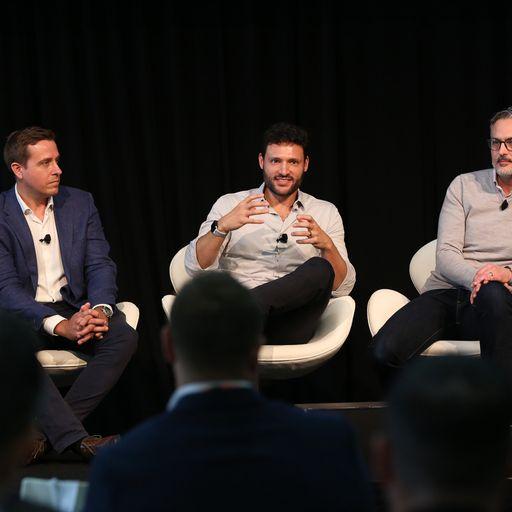
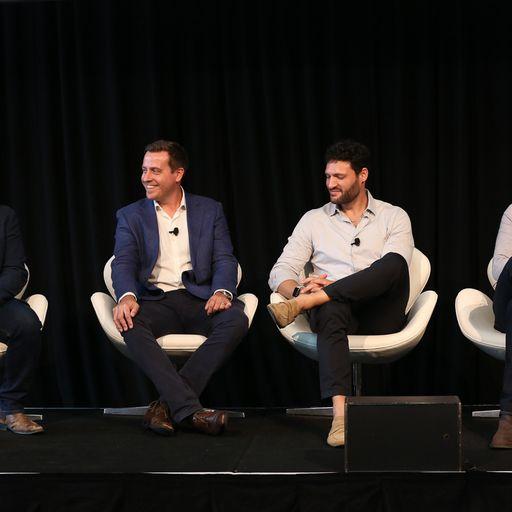

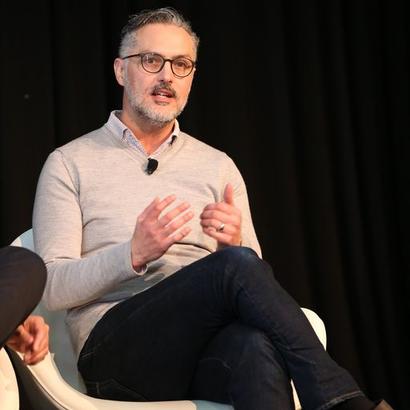

Tariq Nasri, HireVue
Vinnie Brown & Thyago Liberalli
The Tech, Innovation & the Robots Panel
Thyago Liberalli, SEEK






Vinney Brown, ManpowerGroup

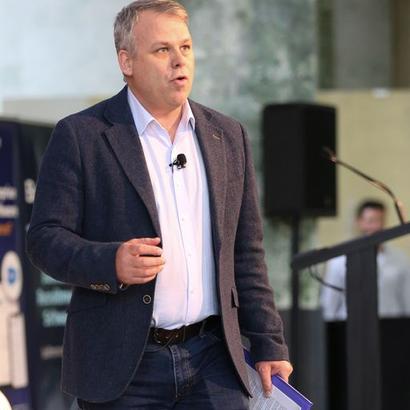
Aaron McIntosh, Bullhorn

In this one-of-a-kind presentation Emerge delegates learnt the key principles, mindset and frameworks of an academically trained and practising futurist, Reanna Browne, who took a deep dive into the Future of Work.
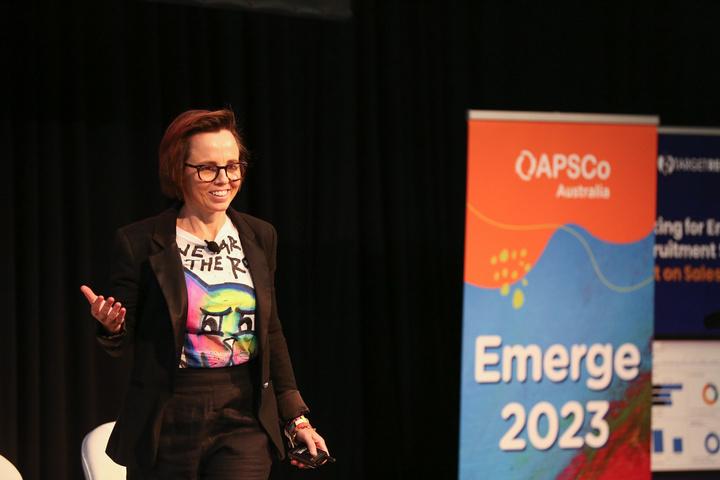

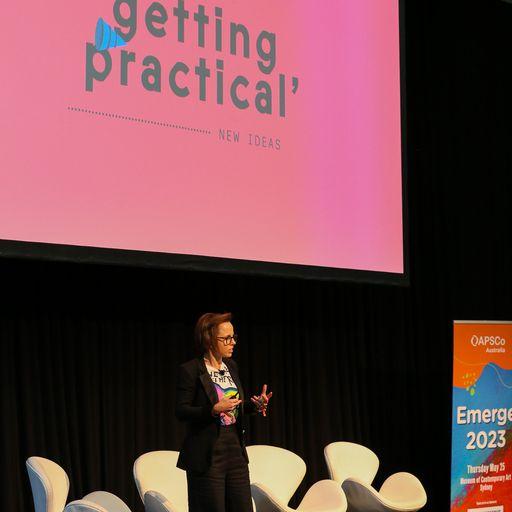

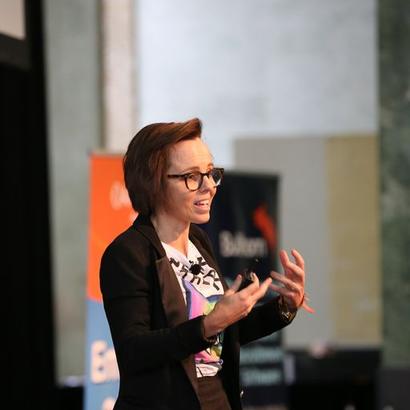
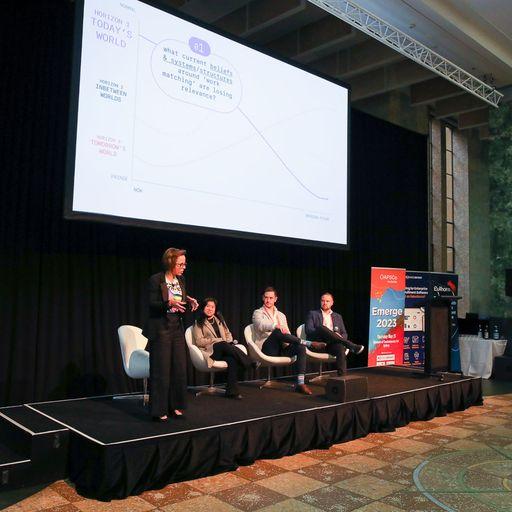
Reanna Browne, Work Futures






The Future(s) of Work Keynote Presentation
Future(s) Mapping Workshop

Audience
Audience
Future(s) Mapping Workshop volunteers
Our panellists from Aquent Australia, The Foreign Office, Healius and Lightbox Communications gave attendees a wealth of motivation to think like marketers in today's recruitment landscape.






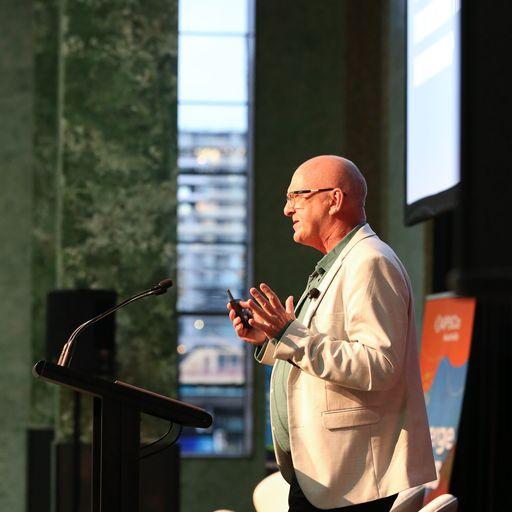

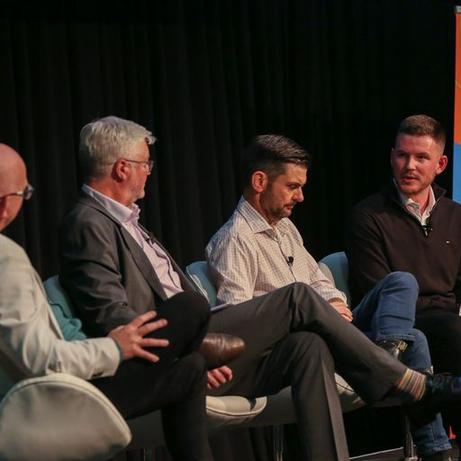
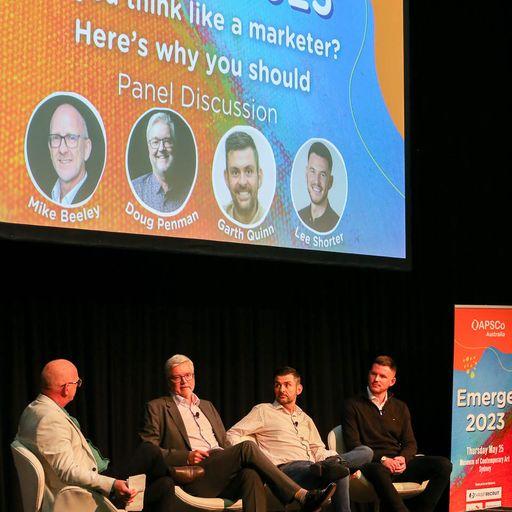

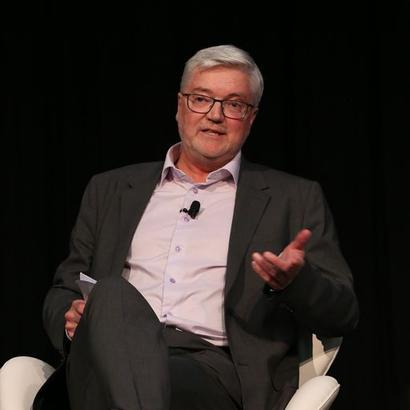

E m e r g e h i g h l i g h t s

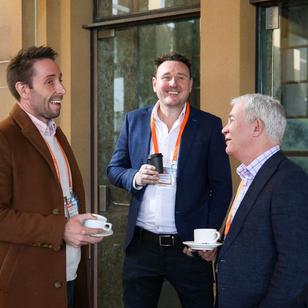

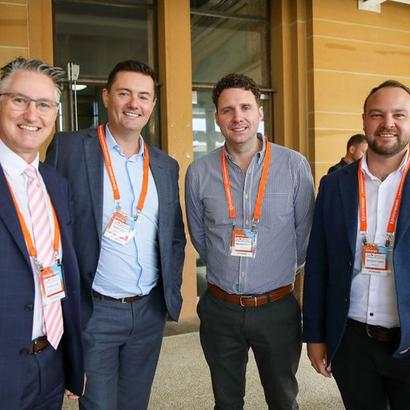



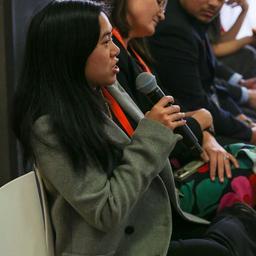


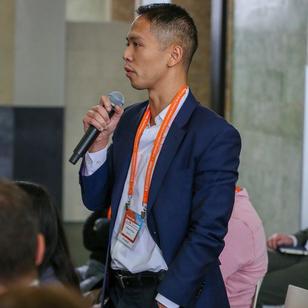

r
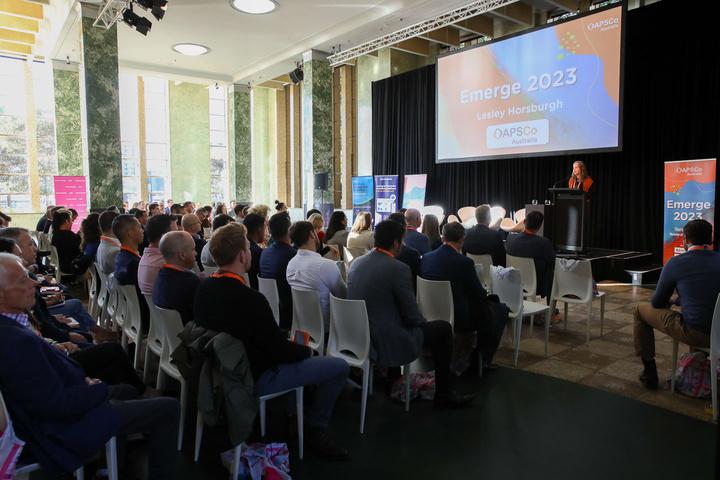
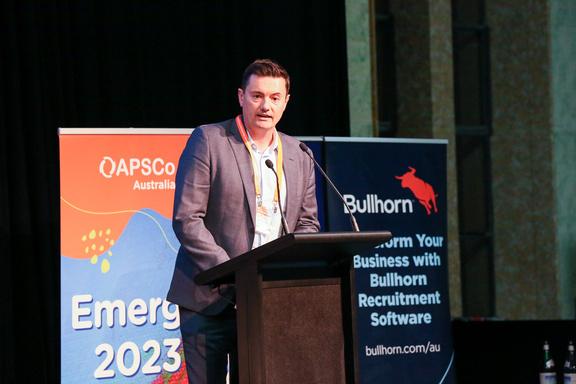




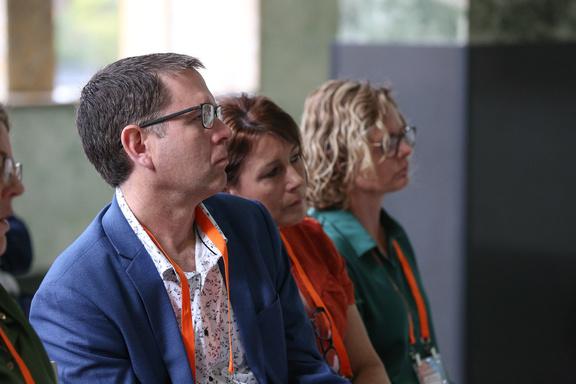


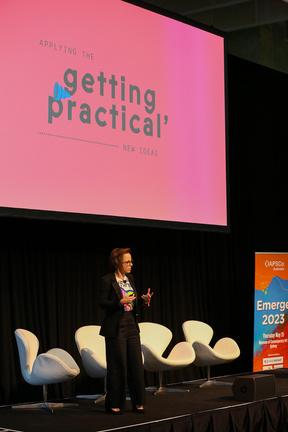
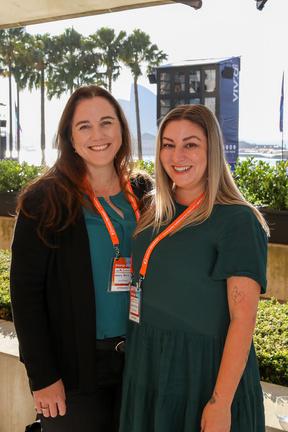

A
o u n d t h e C o n f e r e n c e E m e r g e h i g h l i g h t s

















Thankyoutoour2023PremiumPartners

Thankyoutoour2023AssociatePartner
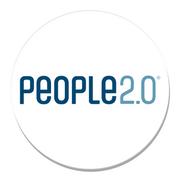


Achieve Corporation
Australia PEO
Bookssorted
Certex International
Daxtra Technologies
FastTrack
Gallagher
HHMC Global
JobAdder
IMS Group

InsuranceHouse
Maynard & Barrett
ONE Recruiter
PayMe Australia


Pendragon Management

Platinum WFM
Ready Set Recruit Legal
Red Bid
SDP Solutions Seek

Sovereign Private
Staffing Industry Metrics
TargetRecruit
Vincere
WorkPro
Younique Coaching
